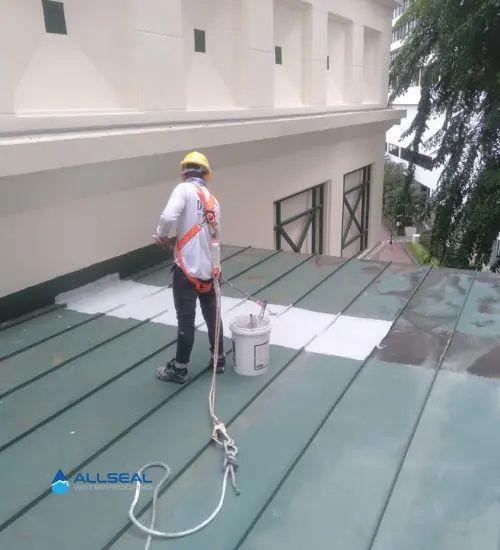Sponsorluk
The Importance of Joint Sealant Maintenance in Waterproofing Systems

In Singapore’s humid, rain-intensive climate, waterproofing is more than just a structural safeguard—it’s a necessity. Among the many components of a robust waterproofing system, joint sealants play a vital role. They act as the flexible, watertight bond that prevents moisture from seeping into structural gaps, especially in high-risk zones like roofs, balconies, bathrooms, and facades.
However, these critical sealants are often neglected, leading to premature waterproofing failure. This comprehensive guide explores why joint sealant maintenance is crucial for long-term building health and how engaging a qualified Waterproofing Specialist in Singapore can prevent expensive repairs and structural degradation.
Understanding the Role of Joint Sealants in Waterproofing
Joint sealants are elastomeric materials applied to gaps, joints, and connection points between different surfaces. These joints are typically present in:
-
Window and door perimeters
-
Concrete expansion joints
-
Between wall panels or façade sections
-
Around plumbing fixtures
-
In roof and floor connections
Their main function is to absorb structural movement while preventing the ingress of water, air, and pollutants.
Without properly maintained joint sealants, even the most advanced waterproofing membranes or coatings can fail. The smallest unsealed joint becomes a direct entry point for moisture, compromising the entire system.
Why Joint Sealants Deteriorate Over Time
Even high-quality sealants degrade with age, environmental exposure, and movement stress. Several factors accelerate their wear:
1. UV Radiation
Constant exposure to sunlight weakens sealant elasticity, causing it to crack or harden.
2. Temperature Fluctuations
In Singapore, thermal expansion and contraction place continuous stress on sealants, especially on exterior joints.
3. Water Accumulation
Standing water around joints softens and erodes certain sealant types.
4. Movement in Building Materials
Buildings naturally shift due to settling, wind load, or minor ground tremors, which can overstretch or break sealant bonds.
5. Poor Application
Improper surface preparation or use of low-grade sealants reduces their lifespan and effectiveness.
Because of these factors, routine inspection and maintenance are essential. A Waterproofing Specialist in Singapore can accurately assess sealant conditions and recommend timely interventions.
Key Areas Where Sealant Maintenance Matters Most
1. External Wall Joints
These include gaps between façade panels, precast concrete units, and curtain walls.
Risks if neglected:
-
Water infiltration into internal walls
-
Rusting of steel reinforcement
-
Mould and mildew in interior spaces
2. Window and Door Frames
Joints around frames are vulnerable to water driven by wind or poor slope ***gn.
Risks if neglected:
-
Leaking during rainstorms
-
Warping of wooden elements
-
Reduced energy efficiency due to air leakage
3. Bathrooms and Wet Areas
Floor and wall junctions, shower enclosures, and around sanitary fixtures must be sealed well.
Risks if neglected:
-
Moisture seeping below tiles
-
Mould and tile detachment
-
Water leakage into adjacent rooms
4. Rooftop Expansion Joints
Flat roof systems and terraces require joints that accommodate movement and block water.
Risks if neglected:
-
Water ponding and leakage
-
Membrane detachment
-
Ceiling stains and structural weakening
Maintaining these areas ensures the entire waterproofing system remains intact.
Signs That Your Sealants Need Maintenance
Homeowners and building managers should conduct visual checks at least twice a year, especially after heavy rain. Watch for these early warning signs:
-
Cracks or splits along joint lines
-
Gaps between the sealant and surface
-
Discoloration or water stains near joints
-
Peeling or detached sealant strips
-
*** during rainfall or high humidity
-
Mould formation in corners and junctions
If any of these symptoms appear, consult a Waterproofing Specialist in Singapore immediately. Delaying repair can result in moisture intrusion and escalating damage.
The Maintenance Process: What It Involves
Sealant maintenance is not just about adding new material on top of the old. A proper process ensures durability and bonding. Here’s what a professional will typically do:
1. Inspection and Testing
A specialist evaluates all joint lines and surrounding surfaces, using tools like moisture meters or visual dye tests if needed.
2. Removal of Old Sealant
The degraded sealant is carefully cut and removed to avoid damaging adjacent surfaces.
3. Surface Preparation
The joint area is cleaned, dried, and primed to enhance adhesion for the new sealant.
4. Application of New Sealant
A compatible, high-performance sealant is applied with precision and tooled for a smooth finish.
5. Curing and Protection
The area is left undisturbed while the sealant cures, ensuring proper bonding and performance.
Regular maintenance—performed every 5–10 years or as needed—protects your structure and prevents costly water damage.
Benefits of Professional Joint Sealant Maintenance
Hiring a qualified Waterproofing Specialist in Singapore offers long-term value:
-
Accurate diagnosis of waterproofing and structural issues
-
Use of industry-grade sealants suitable for Singapore’s climate
-
Proper surface preparation and application techniques
-
Long-term durability and reduced need for frequent repairs
-
Peace of mind with workmanship warranties and follow-up inspections
DIY repairs or using generic sealants may provide temporary relief but often fail under stress or weather exposure.
Common Types of Sealants Used in Singapore
Each location and surface demands a specific type of sealant. Professionals will assess site conditions and choose the appropriate material.
1. Polyurethane (PU) Sealants
-
Excellent for floors and concrete joints
-
Good abrasion resistance
-
Can be painted over
2. Silicone Sealants
-
Ideal for glass, metal, and wet areas
-
High UV and water resistance
-
Long lifespan
3. Hybrid Sealants (Silane-Modified Polymers)
-
Suitable for both indoor and outdoor use
-
Strong adhesion to various materials
-
Paintable and environmentally friendly
The type of sealant impacts the effectiveness of your waterproofing system. Always seek advice from a trusted Waterproofing Specialist in Singapore before selecting products.
How Often Should Joint Sealants Be Maintained?
The frequency of sealant maintenance depends on several factors:
-
Age of the property: Older buildings often have deteriorated sealants.
-
Exposure: Areas with full sun or rain exposure degrade faster.
-
Movement: Expansion joints in high-rise or large buildings need more frequent checks.
-
Usage: Bathrooms and kitchens should be checked annually.
As a general rule, homeowners should schedule sealant inspections every 3–5 years. In commercial or high-use areas, yearly evaluations are recommended.
Consequences of Ignoring Sealant Maintenance
Failing to maintain sealants can result in:
-
Structural water damage
-
Costly repairs to internal finishes
-
Health issues from mould exposure
-
Legal liability in shared properties (e.g., condominiums)
-
Reduction in property value
It is far more economical to maintain joint sealants than to repair the consequences of water infiltration. A proactive approach with regular inspections helps avoid such scenarios.
When to Engage a Waterproofing Specialist in Singapore
If your building has never had a professional waterproofing audit or you notice any of the following, it’s time to act:
-
Post-renovation *** or damp patches
-
Repeated need to repaint or repair interior walls
-
Complaints of musty smells or indoor moisture
-
Surface cracks near windows, roofs, or bathrooms
A Waterproofing Specialist in Singapore will not only maintain or replace your sealants but also inspect the overall waterproofing integrity, provide detailed reports, and recommend long-lasting solutions.
Conclusion
Joint sealants are a small but essential part of your home’s waterproofing defense system. When they are properly maintained, they keep moisture out, protect structural components, and prevent interior damage. When neglected, however, they become the silent cause of persistent ***, mould issues, and expensive structural repairs.
In Singapore’s wet and humid climate, investing in regular sealant maintenance is not optional—it’s necessary. By identifying problem areas early and engaging a qualified Waterproofing Specialist in Singapore, you ensure that your property stays protected, healthy, and structurally sound for years to come.
Stay vigilant, schedule inspections, and trust experts to handle the task with professionalism and care. In doing so, you extend the life of your waterproofing system and your entire building.






